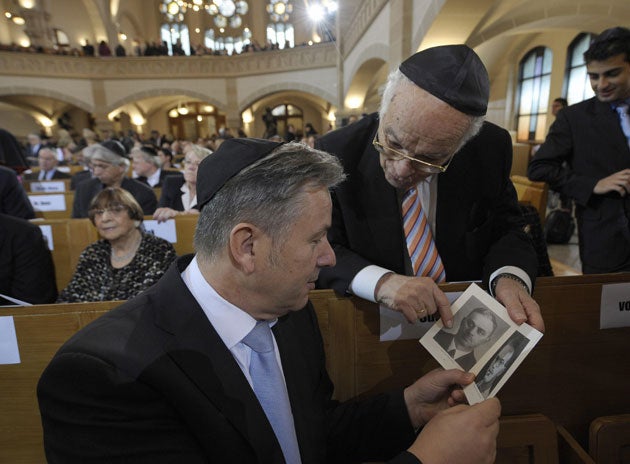Neo-Nazis are back, German Jews warn

The head of Germany's Jewish community revealed that she received death threats which made her fear for her life yesterday in an interview given to mark the 70th anniversary of the infamous Nazi "Kristallnacht" pogrom that paved the way for the Holocaust.
Charlotte Knobloch, the president of Germany's Central Council of Jews, issued a dire warning against the rise of neo-Nazi parties and said she frequently received death threats.
"There are people out there who would rather see me in a cemetery," said Mrs Knobloch, 76, who experienced Kristallnacht as a six-year-old when she fled on to the streets of Munich with her father after his shop was attacked by Nazis. "Sometimes I fear for my life," she added.
Mrs Knobloch called for a government ban on the neo-Nazi National Democratic Party (NPD) which has made a series of sweeping gains in regional state elections in Germany since the fall of the Berlin Wall in 1989.
Her remarks coincided with ceremonies across Germany marking the 70th anniversary of Kristallnacht, or Night of Broken Glass, which lasted through 9 and 10 November 1938.
Adolf Hitler's brownshirts and thousands of sympathisers ransacked Jewish homes and businesses throughout the country. Scores of synagogues were burnt and looted while police and firemen looked on. More than 90 Jewish people were murdered and some 30,000 Jewish men were dispatched to concentration camps.
The pogrom marked a turning point and was the precursor of the systematic persecution of the Jews that followed almost immediately afterwards and led to the death camps of the Holocaust in which six million were murdered.
At an anniversary ceremony at east Berlin's Rykestrasse synagogue, which was only restored to its pre-pogrom glory last year, the Chancellor, Angela Merkel, joined Jewish leaders to urge Germans to take a stand against racism. "Indifference is the first step towards endangering essential values," she said. "Xenophobia, racism and anti-Semitism must never be given an opportunity in Europe again," she added.
Fresh evidence of Kristallnacht surfaced last month after an Israeli journalist discovered a vast rubbish dump outside a village north of Berlin in which items stolen from looted and sacked Jewish homes, businesses and synagogues were dumped. Residents in the village of Klandorf some 35 miles north-east of Berlin told The Independent that the site was chosen by the regime because it was next to the local "Heather railway" line which links the German capital to an idyllic area of lakes and woods outside the city.
"Elderly villagers remember the railway wagons arriving with the debris just days after Kristallnacht and then being told by Nazi officials to go away," said Angelika Gielsdorf, whose family owns part of the land.
A small stone monument marks the site of the former "political prisoner" camp of Gross Schönebeck. It is located right next to the railway line and the rubbish tip, which is covered in weeds and plastered with hand-painted signs warning: "Digging is forbidden."
Gielsdorf family members said that for years after the fall of the Berlin Wall the dump was visited by treasure hunters. They combed through the site looking for anything to sell in the flea markets of Berlin and Leipzig and threatened anyone who tried to stop them with shovels.
Although the Gielsdorfs managed to get a court order banning the treasure hunters, they still come. The family complains that police and local authorities ignore the dump. Yesterday several family members and a handful of other villagers held a small ceremony on the rubbish tip to commemorate the Kristallnacht anniversary.
Kristallnacht: Hitler's night of terror
*On 9 November 1938, Nazi storm-troopers incited anti-Jewish riots across Germany that resulted in the murders of 92 Jews. More than 1,000 synagogues were destroyed or damaged and thousands of Jewish businesses looted as many civilians joined in. On Adolf Hitler's orders, about 30,000 Jewish men and boys were rounded up and sent to concentration camps. The pogrom got its name from the shattered window panes that covered German streets after the attacks.
Join our commenting forum
Join thought-provoking conversations, follow other Independent readers and see their replies
Comments
Bookmark popover
Removed from bookmarks